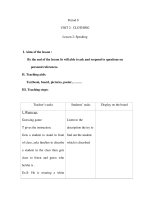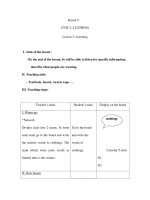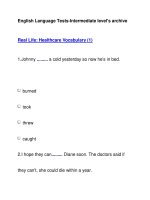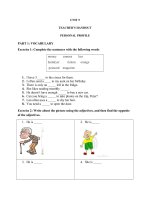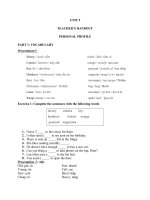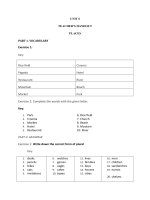UNIT 8TEACHER’S HANDOUT DAILY ROUTINES
Bạn đang xem bản rút gọn của tài liệu. Xem và tải ngay bản đầy đủ của tài liệu tại đây (715.27 KB, 14 trang )
UNIT 8 TEACHER’S HANDOUT
DAILY ROUTINES
VOCABULARY
I.
1. Match the verb in column A and the nouns in column B to form daily routines
phrases.
work
get
go
have
Put on
Have
Cook
Go
Clean
Watch
TV
In a bank
A shower
dinner
To the gym
Out for dinner
breakfast
The house
My make up
dressed
2. Use the phrases in task 1 to complete the passage about Julia’s daily routine
My name's Julia, and I am 20 years old. I live in London but I’m German. I ______________(1) and
I love my job. From Monday to Friday, my day starts very early. I always get up at 6:30 and I
______________(2).Then, I
______________(3) and comb my hair. At 07:00 a.m I
_____________(4), I usually have coffee and cereal. After that, I ____________(5) and go to work.
At 10:00 a.m., I sometimes have a snack and at 12:00 I usually have lunch at the office with my
colleagues. They are wonderful people who have a good sense of humor, and they are good friends
too. At
3:30
I
have
a
snack
again,
I
usually
have
some
tea
and
biscuits.
On Monday, Tuesday and Wednesday ______________(6) after work. When I get home, I have a
shower again, I ______________(7) and I ______________(8) for a while. I like to go to bed as
soon
as
possible,
around
9:30.
Thursday is different because I don't go to the gym. I go out with my boyfriend every Thursday. We
sometimes
My
go
to
boyfriend's
the
name
cinema
is
or
Daniel,
we
he
______________(9)
is
31
years
old,
and
and
to
have
he's
an
a
drink.
architect.
His family is from Spain. He has two brothers and no sisters. We have been a couple for six years.
On Friday night I always go out with my friends, we sometimes go to a bar and sometimes we meet
at a friend’s house but I can't be home late because I have to get up early on Saturday to
______________(10).
II.
GRAMMAR
1. ADVERBS OF FREQUENCY (Trạng từ tần suất):
-
always, usually, often, sometimes, occasionally, seldom, rarely, never
Trạng từ tần suất được dùng để trả lời cho câu hỏi với How often.
Trạng từ tần suất thường đứng trước động từ thường (go, play…), sau động từ đặc biệt
(be, will, can…), giữa trợ động từ và động từ chính. Sometimes, occasionally, usually, often
-
có thể đứng đầu câu hoặc cuối câu để nhấn mạnh hoặc chỉ sự tương phản.
Các cụm trạng từ chỉ tần suất như every morning, every day, once a week, twice a month,
three times a year… thường đứng đầu hoặc cuối câu.
2. STRUCTURES
a. How often + do/does+ S+ V?
Sử dụng những trạng ngữ tần suất để trả lời:
always, usually, often, sometimes, once a week / twice a month /
three times a year, every day / night / week / month / year,…
Eg: How often do you listen to music? Twice a week
b.
What time/ When + do/does+ S+ V?
S + V+ at + “time”
Eg: What time do you have breakfast?
I have breakfast at 7 o’clock
RULES FOR SAYING TIME:
Minute + hour
1.
“O’clock” - at full hour. (Giờ đúng)
Eg: It’s 6 o’clock. (6h00)
2.
Minute + Past/After + Hour (Giờ hơn)
Eg: It’s five past seven. (7h05’)
3.
Minute + To + Hour (Giờ kém)
Eg: It’s ten to eight. (7h50’)
4.
30 minutes = half (giờ rưỡi)
Eg: It’s half past eight. (8h30)
5.
15 minutes = quarter (giờ hơn/kém 15’)
Eg: It’s quarter to nine (8h45)
Hour + Minute
Eg: It’s nine ten. (9h10’)
It’s eight thirty. (8h30)
It’s eight forty-five. (8h45)
Exercise 1: Complete the sentences:
1. I never_____________________
6.I usually _____________________
2. I often____________________
7. I always_____________________
3. I usually_____________________
8. I often_____________________
4. I always_____________________
9.I usually _____________________
5. I sometimes_____________________
10.I hardly _____________________
Exercise 2: Say about time:
III.
1. 4h30
9. 9h35
2. 3h10
10. 5h20
3. 5h
11. 6h17
4. 7h40
12. 7h25
5. 11h30
13. 11h45
6. 10h55
14. 1h10
7. 12h5
15. 2h22
8. 8h15
16. 3h2
17.
18.
19.
20.
LISTENING
21. Exercise 1: Listen and choose the correct picture
22.
23.
24.
25.
26. Exercise 2: Listen to the audio file. Then match the times with the
activities. Write the correct letters (A, B, C ...)
1.
2.
3.
4.
5.
6.
7.
27. TIMES
Monday
Tuesday afternoon
On Wednesday morning
On Thursday night
On Friday night
On Saturday
On Sunday
28.
30.
31.
32.
33.
34.
35.
36.
29. ACTIVITIES
A.
B.
C.
D.
E.
F.
G.
Go out to clubs
Relax at home
Visit parents
Work late
Go to the gym
Meet my friends Bill
Business meeting
37.
38. Exercise 3: Listen and decide if the statement is true (T) or false (F).
1. She gets up at twenty past seven.
1. She has breakfast, and then has a shower.
1. She sometimes has a coffee for breakfast.
1. She has lunch in her office.
1. On Saturdays and Sundays, she sleeps more.
39.
40.
41.
42.
43.
44.
45. Exercise 4: Listen to the audio and put the words from the table into the
blanks
46. lunch
47. with my friends
a coffee
to eat in a restaurant
to bed
until about midday
my newspaper
my e-mail
a pastry and a coffee
to relax
arrive
the internet
with the music
do some shopping first
48.
49.
50. Elisa's Diary
51. 7.00: I get up.
52. 8.00: Check _______________________(1) .
53. 9.00: Use _______________________(2).
54. 10.00: Have _______________________(3) in a cafe and read _______________________(4).
55. 11.00: My car arrives to take me to the studio.
56. 12.00: Drink _______________________(5) with other members of the group. Then
start work.
57. 1.00 - 2.00: Recording in the studio.
58. 3.00: Eat _______________________(6)
59. 4.00 - 6.00: Help the rest of the group _______________________(7).
60. 7.00: _______________________(8) home.
61. 9.00 - 10.00: Go out.
62. 11.00: Go _______________________(9).
63.
Exercise 5: Listen to the conversation and answer the following questions
64. 1. What time does the man get up?
65. A. at 5:00
66. B. at 6:00
a.m.
68. 2. What time does he get to work?
a.m.
67. C. at 7:00
a.m.
69. A. at 7:00
70. B. at 8:00
a.m.
71. C. at 9:00
a.m.
a.m.
72. 3. What does he do with his family around 6:30 p.m.?
73. A. They read books together.
74. B. They play games.
75. C. They eat dinner.
76. 4. What do the man and his wife do after the kids go to bed?
77. A. They watch TV.
78. B. They clean the house.
79. C. They listen to music.
80. 5. What is one thing the man does NOT say about his wife?
81. A. She has to take their children to school.
82. B. She helps the kids with their homework.
83. C. She goes shopping for food.
84.
85.
86.
87.
88.
IV.
SPEAKING
1. Answer the questions and ask your friend to complete the table
89. How often do
90. You
91. Your partner
you …?
92. Go dancing
95. Have a coffee
98. Go
to
a
93.
96.
99.
94.
97.
100.
concert
101.
Watch the
102.
103.
news
104.
Do
105.
106.
homework
Drink
108.
109.
whisky
Go to the
111.
112.
movies
Go
out
114.
115.
for dinner
116.
Meet new
117.
118.
107.
110.
113.
people
119.
Chat
on
120.
121.
the internet
Do sports
Play
123.
126.
124.
127.
128.
games
Go
129.
130.
swimming
131.
Practice
132.
133.
135.
136.
122.
125.
computer
speaking
English
134.
Take
selfie
137.
138.
2. Talk to the class about a daily routine of an English teacher
139.
140.
V. WRITING
142.
141.
Exercise 1: Write questions. And use the word in (...) to answer
Example: Where / John / come from? (America)
143.
=> Where does John come from?
John comes from America
144.
1. Where / Alison / learn Japanese? (Language Center)
145.
2. What / your husband / do? (Doctor)
3. How much / this book / cost? (Three pounds seventy-five)
4. What time / Mark / leave in the mornings? (7.00)
5. How many children / your sister / have? (3)
Exercise 2: Write the questions and the negative form of the
146.
sentences:
147.
Example: Keiko works at weekends.
=> When does Keiko work?
148.
=> Keiko doesn’t work at weekends.
149.
1. Barbara drives to work.
2. She watches TV every morning.
3. He goes to the supermarket every day.
4. My brother wears a uniform at work.
5. He has a lot of free time in the evenings.
150.
Exercise 3: Write about your own daily routine, using as many adverbs
of frequency as you can
151.
152.
153.
154.
155.
156.
157.
158.
KEY
VOCABULARY
159.
I.
1.
2.
3.
4.
5.
6.
7.
8.
9.
10.
work in a bank
have a shower.
get dressed
have breakfast,
put on my make up
I go to the gym
cook dinner
watch TV
go out for dinner
clean the house.
160.
GRAMMAR
161. Exercise 1: VARIED
162. Exercise 2:
II.
1. Four thirty
9. Nine thirty five
2. Three ten
10. Five twenty
3. Five
11. Six seventeen
4. Seven forty
12. Seven twenty five
5. Eleven thirty
13. Eleven forty five
6. Ten fifty five
14. One ten
7. Twelve five
15. Two twenty two
8. Eight fifteen
16. Three tw
.
LISTENING
Exercise 1:
III.
1.
2.
3.
4.
5.
1.
Go to school
Brush your teeth
Dry your hair
Take a bath
Wake up
6.
7.
8.
9.
10.
Eat breakfast
Study
Get dressed
Wash your face
Get home
Exercise 2:
2.
3.
4.
5.
6.
7.
8.
9.
10.
Exercise 3:
1. F
6.
1.
2.
3.
4.
5.
2. F
3. F
4. T
5. T
Exercise 4:
My e-mail
The internet
A pastry and a coffee
My newspaper
A coffee
6.
7.
8.
9.
Lunch
With the music
Arrive
To eat in a restaurant and to bed
Exercise 5:
10.
11. A
2. B
3. C
4. A
5. B
11.
IV.
12.
SPEAKING
13.
14. He gets up at 9.30
15. After that, he has a coffee and a shower
16. After having breakfast at 10.30, he gets dressed and goes to work by train
17. He starts class at 12.00
18. He teaches from 12.00 to 2.00
19. He has lunch at 2.30
20. He teaches from 4.00 to 9.30
21. He meets and has a drink with his friends at 10.00
22. He goes home by train at 11.30
23. He corrects homework from 12.00 to 1.00
24. He goes to bed at 1.30
25.
V.
WRITING:
26. Excercise 1:
1. Where does Alison learn Japanese?
27. Alison learns Japanese at the Language Center
2. What does your husband do?
28. He is a doctor
3. How much d oes this book cost?
29. It is three pounds seventy-five
4. What time d oes Mark leave in the mornings?
30. He leaves at 7.00
5. How many children d oes your sister have?
31. She has 3
32.
33.
Exercise 2:
34. 1. How does Barbara go to work?
35.
Barbara doesnt drive to work.
2. How often does he watch TV?
36.
She doesn’t watch TV every morning.
3. How often does he go to the super market?
37.
He doesn’t go to the supermarket every day.
4. What does your brother wear at work?
38.
My brother doesn’t wear a uniform at work.
5. When does he have a lot of free time?
39.
He doesn’t have a lot of free time in the evenings.
40.
Exercise 3: VARIED
